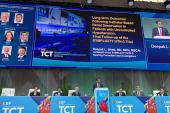BP Reduction With Renal Denervation Still Evident a Decade On
The new analysis has several limitations, but Deepak Bhatt says it provides reassurances about the durability of the procedure.

(UPDATED) Its data are from a single center, there’s no control group, and plenty of patients were lost to follow-up, but a new study’s results hint at a sustained reduction in systolic blood pressure for patients treated with renal denervation.
Ten years after the procedure, the 24-hour systolic blood pressure was down 16.2 mm Hg from baseline in a group of patients with resistant hypertension treated with the radiofrequency-based Symplicity Flex single-electrode catheter (Medtronic). During this time, patients remained stable on medication while taking, on average, 4.5 antihypertensive drugs.
The study, published as a research letter online ahead of the February 7, 2023, issue of the Journal of the American College of Cardiology, provides the longest follow-up of patients treated with renal denervation to date, according to Hussam Al Ghorani, MD (Saarland University, Homburg/Saar, Germany), and colleagues.
“To the best of our knowledge, our study was the first analyzing the efficacy, using both ambulatory and standardized office blood pressure measurements, and safety of catheter-based radiofrequency renal denervation out to 10 years,” Al Ghorani told TCTMD. “Before our study, the longest data on efficacy and safety of renal denervation is derived from the Global SYMPLICITY Registry and was 3 years. Long-term data beyond 3 years were lacking.”
Still, the researchers express a cautious note given its numerous limitations. This was a single-arm study, and a “substantial” number of patients were lost to follow-up. Of the 107 eligible patients, 10-year data were available on only 39 people.
“Most limitations are present due to the nature of the study design,” said Al Ghorani. “It is almost impossible to design a randomized controlled trial investigation with ultra-long-term outcomes without having some limitations, especially because of many confounders and variables that might affect blood pressure measurements.”
Additionally, the device used to treat patients was the single-electrode Simplicity Flex catheter system, so it’s unknown if the same, or possibly better, long-term outcomes could be expected with other systems. These include devices such as the multi-electrode Spyral (Medtronic) renal denervation system, ultrasound-based ablation with Paradise (ReCor Medical), or alcohol-mediated denervation with the Peregrine system (Ablative Solutions), all of which have CE Mark approval in Europe.
Data on Available Patients
Deepak Bhatt, MD (Icahn School of Medicine at Mount Sinai, New York, NY), who led the SYMPLICITY HTN-3 trial, said such long-term follow-up is extremely rare outside of surgery trials and praised the investigators for tracking these patients. Like the researchers, Bhatt acknowledged the study’s limitations. “Nevertheless, it’s better than having no information as far as 10-year follow-up,” Bhatt told TCTMD. “It shows the procedure appeared to be producing a durable effect.” He added that patients with hypertension taking medication usually have an increase in systolic blood pressure over time.
“Even though it’s not randomized, even though it’s a select subgroup of patients with follow-up, I think it’s still encouraging that the blood pressure is lower and not higher after 10 years in these patients who had renal denervation,” said Bhatt. “To me it does add to our growing body of knowledge that there is a sustained and durable effect of renal denervation.”
In SYMPLICITY HTN-3, a randomized trial that included a sham-control arm, there was no significant reduction in blood pressure at 6 months—the primary endpoint—but investigators did show a significant reduction in office and 24-hour systolic blood pressure with renal denervation at 3 years. Those data are the longest available follow-up of patients treated with the procedure in a randomized trial setting.
For the 39 patients treated at Saarland University Hospital, the mean follow-up duration was 9.4 years. Despite treatment with five antihypertensive medications, the 24-hour ambulatory blood pressure at baseline was 152/85 mm Hg. At 1, 2, and 10 years, 24-hour systolic blood pressure was 12.2, 16.8, and 16.2 mm Hg lower, respectively, than at baseline. Estimated glomerular filtration rate (eGFR) also declined significantly over time, from 68.7 mL/min/1.73 m2 at baseline to 60.2 mL/min/1.73 m2 at 10 years (P < 0.001).
“Interestingly, the number of antihypertensive drugs was insignificantly reduced over the follow-up period, indicating that the observed BP changes were unlikely related to increase in drug treatment,” according to the researchers.
The group says the reduction in systolic blood pressure is in line with 3-year data from the global SIMPLICITY registry of more than 3,000 patients with uncontrolled hypertension. In those patients, office and 24-hour ambulatory systolic blood pressure were reduced 16.7 and 9.0 mm Hg, respectively, with renal denervation.
Andrew Sharp, MD (University of Cardiff, Wales), who wasn’t involved in the present study, said it is hypothesis-generating only given its limitations—for example, those with largest reductions in systolic blood pressure might have been the happiest to return at 10 years—but that the results are in line with 3-year follow-up from SPYRAL ON-MED pilot study published in the Lancet. He also noted that there are Australian data, presented at the 2022 European Society of Hypertension meeting, out to 8.8 years showing a similar reduction in 24-hour ambulatory systolic blood pressure as that seen in the SIMPLICITY registry.
“Behavior can change over time, so it would interesting to understand whether weight reduction, alcohol reduction, or other lifestyle changes could have ‘topped up’ the effect, but we can’t easily control for that over such a long time horizon,” Sharp told TCTMD. “Of course, blood pressure typically rises over that sort of time horizon with the natural ageing process, so what I take from these data is encouragement that those who reached follow-up had substantially better blood pressure with no safety concerns, which is better than the alternative.”
How Long Does It Last?
In their clinic, Al Ghorani said one of the most frequent questions from patients is how long the effects of renal denervation will last. Preclinical animal data has suggested some regrowth of the renal nerves, with variable restoration of functional response, in long-term follow-up.
“The observed blood pressure reductions in our study were sustained until 10 years after renal denervation, which indicates that even if a potential structural nerve [regrowth] following the procedure has occurred, as suggested in preclinical studies, it may not be relevant for BP control,” said Al Ghorani. “So with that being said, I do personally believe that in terms of mechanism, the blood pressure reduction after renal denervation should remain permanent, if not completely [then] at least partially.”
To TCTMD, Bhatt said there had been some initial concern about re-enervation of the renal sympathetic nerves or that there’d be other adaptations that might lead to a rise in blood pressure over time. Based on the evidence, the field is confident neither is occurring, said Bhatt. He added that they have no further plans to follow patients in SYMPLICITY HTN-3.
Sharp recently published preclinical data showing that a fully denervated nerve targeted with the procedure “is unlikely to recover.”
“I think we can be reasonably sure that if the nerves are adequately denervated, they are likely to stay denervated, though of course as arteries harden over time, one would expect a progression of the underlying disease process and a return of hypertension, which is a multifactorial disease,” he said.
Lifestyle, Drugs, Then Renal Denervation
Right now, renal denervation isn’t approved in the United States, but Medtronic is seeking Food and Drug Administration approval of the Spyral device. If it’s approved by the FDA, Bhatt said the treatment could be useful for patients who maximized efforts to lower their blood pressure with lifestyle changes and medication.
“These data suggest that whatever effect is produced seems to be long-lasting,” he said. “There were also no safety issues emerging late, and that’s good to know even in the absence of randomization. In terms of kidney function, it declined in this population, as you would expect, but it didn’t seem to decline in a more rapid pace than one would have expected in a population with severe, uncontrolled hypertension.”
Sharp said that renal denervation should be considered as an adjunct to “good hypertensive care” alongside lifestyle measures and medication, “not in place of it.” Lifestyle and drug therapy should be tried first. “However, with blood pressure control rates for a conservative target of 140/90 [mm Hg] achieved in only half of patients known to have the disease, there remains plenty of room for new treatments. We now have one which does not rely on daily adherence, which is the key benefit of this procedure,” he said.
One of the remaining issues to solve is the cost of the procedure, Sharp noted. He and others are working on a cost-effectiveness analysis which will be published soon, although the topline results have already been released at a conference. At a cost per quality-adjusted life-year threshold £20,000 used by the National Institute for Health and Care Excellence, renal denervation is likely to be cost-effective, said Sharp.
Michael O’Riordan is the Managing Editor for TCTMD. He completed his undergraduate degrees at Queen’s University in Kingston, ON, and…
Read Full BioSources
Al Ghorani H, Kulenthiran S, Recktenwald MJM, et al. 10-year outcomes of catheter-based renal denervation in patients with resistant hypertension. J Am Coll Cardiol. 2023;81:517-519.
Disclosures
- Al Ghorani reports no relevant conflicts of interest.
- Bhatt reports serving as the co-principal investigator of SYMPLICITY HTN-3 with funding from Medtronic paid to his previous institution (Brigham and Women’s Hospital). He reports receiving research funding or unfunded research support from Abbott, Amarin, Amgen, AstraZeneca, Bayer, Boehringer Ingelheim, Bristol-Myers Squibb, Chiesi, Eisai, Ethicon, Forest Laboratories, Idorsia, Ironwood, Ischemix, Lilly, Medtronic, PhaseBio, Pfizer, Regeneron, Roche, Sanofi, Synaptic, The Medicines Company, FlowCo, Merck, Novo Nordisk, PLx Pharma, and Takeda; being a site co-investigator for Biotronik, Boston Scientific, St. Jude Medical, and Svelte; being a trustee for ACC; serving as an advisory board member, director, or chair for Cardax, Elsevier Practice Update Cardiology, Medscape Cardiology, Regado Biosciences; the Boston VA Research Institute, the Society of Cardiovascular Patient Care, TobeSoft; the American Heart Association Quality Oversight Committee; serving on a range of data safety monitoring committees; receiving honoraria for editorial or committee activities for a range of publications and organizations; and receiving royalties from Elsevier.
- Sharp reports consulting to Boston Scientific, Medtronic, ReCor Medical, Philips, and Penumbra.





Comments